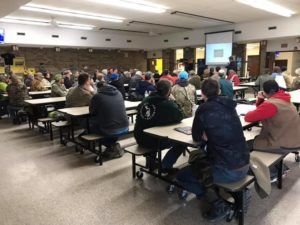Northeast Food Plot and Habitat Event
On Saturday, February 23 the Northern Jack Pine QDMA Branch in partnership with the Ogema Hills QDM Cooperative held a food plot and habitat day for Northeast hunters. The event was held at Ogema Hills High School and there were a whopping 75 people in attendance!
This event held a dual purpose.
- Inform the hunting community of innovative ways they can improve their deer hunting experience and habitat.
- Continue building the relationships between hunters and local DNR biologists, consultants and other professionals to improve communication and management.
The day kicked off with a presentation by Nick Percy, owner of Killer Food Plots. Nick spent time discussing how hunters can utilize space on their properties to provide wildlife with nutrition through food plots and also maximize their hunting opportunity. Food plots have become even more of a hot topic in light of the baiting and feeding ban in Michigan’s lower peninsula. This ban was put in place to help combat the transmission of Chronic Wasting Disease (CWD).
I was able to share the stage with a very accomplished cooperative leader from the Northeast who represented the Anchor Creek Wildlife Cooperative. We discussed how cooperatives address the mission goals of QDMA, how cooperatives play a role in disease management and gathering information on private lands, and how to start one.
Representation from Michigan DNR discussed forestry practices in the Northeast and ongoing TB management. 
Having this group together was proof of the collective efforts that stem from communication. Each presentation was relatable to the next in some fashion whether that be herd and habitat monitoring or working with other landowners to understand the deer herd at a landscape level. It is important that we work with our local community. Change does not happen without ample attempts to share knowledge and ask questions.
If you are interested in events such as this one or interested in learning more about wildlife cooperatives please contact Morgan Warda at mwarda@mucc.org or 517-346-6454. For a schedule of our 2019 events please visit our website and Facebook page.
The post Northeast Food Plot and Habitat Event appeared first on Michigan United Conservation Clubs.
Recent Posts



